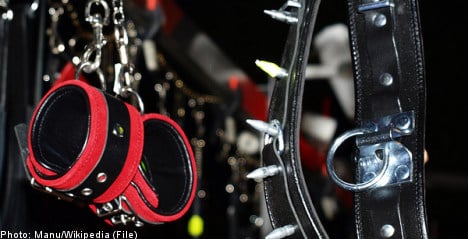“It gives me flashbacks to the final scenes from ‘The Girl with the Dragon Tattoo’,” one source told the Aftonbladet newspaper, referring to the first installment of the Millennium crime trilogy.
The secret room was discovered by two amateur photographers who were exploring the property in Vrangelsro outside of Halmstad when they stumbled upon a hatch in the kitchen floor behind a pantry, the newspaper reported.
Beneath the cabin, which had been abandoned for more than 20 years, they found a darkened dungeon-like room with a bed, harnesses, handcuffs, lubricant, adult diapers, and other sex toys.
The floor was also littered with partially empty bottles of soda and juice, as well a rubber hose running from one empty container to the bed.
“I didn’t know what to think. But pretty soon thoughts came to mind that maybe someone had been held against their will,” one of the photographers told Aftonbladet.
Unsure as to whether the room was used as part of an elaborate sex fantasy by consenting adults, or if it may have been used to forcefully hold someone prisoner, the pair reported their discovery to police, who promptly launched a preliminary investigation into possible criminal activities.
At the weekend, police dogs were dispatched to search the property and several items found in the mysterious sex-chamber have been sent to the Swedish National Laboratory of Forensic Science (Statens kriminaltekniska laboratorium – SKL) for DNA analysis.
Police have also questioned a 47-year-old man who placed an ad on a well-known internet sex-chat forum.
“Seeking submissive tramps for my torture-chamber, for a tough assignment without any chance for mercy. Preferably from Halland,” read the man’s posting, referring to the county where the abandoned cabin lies.
While the man confirmed to Aftonbladet that he placed the ad, he denied having anything to do with the sex-chamber under investigation by police, claiming his post was simply meant to “spark interest”.
Another theory suggested by former criminal inspector Bo Wide is that the elaborately-outfitted room may have been used as a set for a movie. While he doubted that the room was used for criminal activities, he added that police are justified in looking into the matter.
“There needs to be an explanation. If they can figure out who has been there and if this was voluntary, then they don’t have to spend time looking for a body,” he told the newspaper.
Xzenu Cronström Beskow, an expert on sadomasochism with the Swedish Association for Sexuality Education (Riksförbundet för Sexuell Upplysning – RFSU) told the Metro newspaper it’s “not at all uncommon” for people to have a hobby room of some sort to act out their sexual fantasies.
He added, however, that having such a room in an abandoned cabin deep in the Swedish woods “is a bit unusual”.



 Please whitelist us to continue reading.
Please whitelist us to continue reading.
Member comments